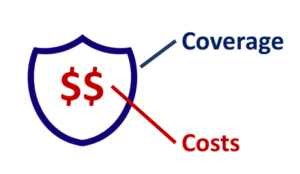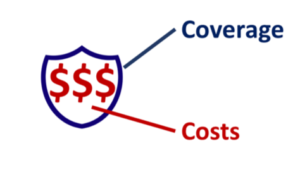Life Insurance in Vancouver
What you need to know when getting life insurance in Vancouver
Here are all the key insights you need to make an informed decision about life insurance in Vancouver. Simply click on the topic of interest to jump to the corresponding section.

> How much life insurance do I need? (click to scroll)
> Sample insurance quotes for Vancouver (click to scroll)
> Types of life insurance and when to choose what (click to scroll)
> Our insurance specialists in Vancouver, BC (click to scroll)
> What to consider when choosing life insurance in Vancouver (BC) (click to scroll)
Life insurance in Vancouver, BC – tailored insurance quote
How much life insurance do I need?
When you decide to buy a life insurance policy, its main objective is to make sure that your loved ones are protected and taken care of, should anything happen to you.
Here are several considerations for choosing the level of coverage.
| Key area to cover | Approximate value |
| Average home price (relevant for coverage of outstanding mortgage costs) | |
| Greater Vancouver (2019*) | $1,011,200 |
| Fraser Valley (2019*) | $830,000 |
| Victoria (2019*) | $683,900 |
| Vancouver Island (2019*) | $488,800 |
| Okanagan, Mainland (2019*) | $496,600 |
| Average debt (i.e. outstanding debt excluding mortgages; may include credit cards, lines of credit , etc.) | |
| British Columbia (2018**) | $24,759 |
| Vancouver (2018**) | $26,432 |
| Children costs (please consider that these are costs for one child only) | |
| Costs to raise a child to until age 18 (2018***) | $257,364 |
| Average income to substitute (i.e. income that your loved one might loose if anything happens to you) | |
| Average salary, BC (2017) | $49,244 |
| Average salary, Canada (2017) | $51,000 |
| Substituting 10 years of income in BC | $492,440 |
| Substituting 20 years of income in BC | $984,880 |
* March 2019 (CREA)
** Q2 2018 (Equifax Canada)
*** Based on MoneySense estimation in 2018 dollars
How to choose among the types of life insurance
1. Traditional (Standard) Life Insurance:
 This is the cheapest and most common type of life insurance. It comes with a medical test and extensive medical questionnaire. The rates are typically low and you can expect large coverage amounts.
This is the cheapest and most common type of life insurance. It comes with a medical test and extensive medical questionnaire. The rates are typically low and you can expect large coverage amounts.
It is a great choice for people who have no serious health conditions, who are in decent physical shape, and who are below 60 years of age.
2. Rated (Standard) Life Insurance:
 This insurance is very similar to traditional (standard) life insurance with the only difference being that a policyholder might have some serious health issues (such as a manageable case of diabetes).
This insurance is very similar to traditional (standard) life insurance with the only difference being that a policyholder might have some serious health issues (such as a manageable case of diabetes).
He/she can also be in less than perfect physical shape (e.g. overweight, etc.).
3. Simplified Issue No Medical Life Insurance:
 This insurance comes WITHOUT a medical exam and you are asked to complete a short questionnaire (just a few questions). Though coverage limits are lower than for traditional (standard) life insurance, this policy offers decent insurance protection.
This insurance comes WITHOUT a medical exam and you are asked to complete a short questionnaire (just a few questions). Though coverage limits are lower than for traditional (standard) life insurance, this policy offers decent insurance protection.
It is a great choice for those who might be declined for standard/traditional life insurance due to a health condition or for those who want avoid completing medical tests as a part of the insurance process.
4. Guaranteed Issue No Medical Life Insurance:
 This insurance comes WITHOUT a medical exam and without any questionnaires. Everybody is automatically approved for this policy.
This insurance comes WITHOUT a medical exam and without any questionnaires. Everybody is automatically approved for this policy.
It comes at a cost – you are looking at a much smaller life insurance policy at higher price. At the same time, in most cases, an insurance claim will not be paid in the first two years (to ensure that there is no insurance fraud).
This policy is recommended for those who will not be able to qualify for any other insurance type because of their health or age.
Sample Insurance quotes for Vancouver, BC
Insurance Type: Traditional Life
(no serious preconditions)
Life insurance quote for a male, 35 years old, non-smoker, Term 15 life insurance with $350,000 coverage.
Quotes starting at $24 / month
Insurance Type: Traditional Life
(no serious preconditions)
Life insurance quote for a male, 45 years old, non-smoker, Term 20 life insurance with $500,000 coverage.
Quotes starting at $81 / month
Insurance Type: Simplified Issue No Medical Insurance
(no serious preconditions)
Woman, 65 year old, non-smoker, no significant health preconditions, not overweight, $25,000 coverage.
Quotes starting at $30/month
Insurance Type: Guaranteed Issue No Medical Insurance
(no serious preconditions)
Woman, 70 year old, non-smoker, no significant health preconditions, not overweight
Quotes starting at $213/month
Our Insurance specialists for Vancouver, BC

VERA BILIMORIA
Core experience: Life Insurance, Disability Insurance, Critical Illness Insurance and Long-Term Care Insurance
Languages spoken: English, German, Spanish

RICHARD PARKINSON
Core experience: Life Insurance, Disability Insurance, Critical Illness Insurance, Health Insurance
Languages spoken: English, Hindi, Urdu, Punjabi, Russian

CASEY CAMERON
Core experience: Life Insurance, Disability Insurance, Critical Illness Insurance, Health Insurance
Languages spoken: English
Life Insurance Regulator in British Columbia
The above insurance consultants are independent brokers and not employees of nomedicallifeinsurance.ca / LSM insurance.” under the “Our Insurance specialists
Link: Insurance Council of British Columbia

Life Insurance Regulator in British Columbia
When you decide a life insurance policy, it is main objective is to make sure that your loved ones are protected and taken care of, should anything happen to you.
Here are a few additional things to know about life insurance in Vancouver (British Columbia):
Nature disasters in the Vancouver area:
Living in an area so prone to natural disaster (e.g. earthquakes) can make many residents hard to insure applicants in the eyes of any insurance company. Regardless of this, however, residents need health, life, home and auto insurance. Premiums may be higher, but in the long run the additional cost is worth the coverage that will certainly be made use of at some point.
Lifestyle in Vancouver:
It’s not all about the chance of natural disaster that makes rates here run higher than elsewhere, but rather the simple difference in lifestyle. Living on the ocean and the hazards that come with it, including the chance of accidents at sea, and the threats people face when swimming in the ocean (wildlife, undertows and drowning hazard), all contribute to both the necessity of coverage and the cost of it.
